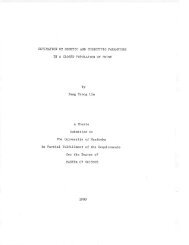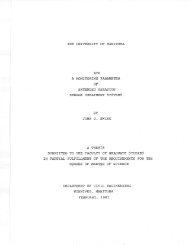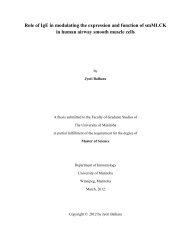Adverbial and Argument-Doubling Clauses in Cree - MSpace
Adverbial and Argument-Doubling Clauses in Cree - MSpace
Adverbial and Argument-Doubling Clauses in Cree - MSpace
Create successful ePaper yourself
Turn your PDF publications into a flip-book with our unique Google optimized e-Paper software.
eferential, but because they are al1 co-rrferentiaï with<strong>in</strong> a s<strong>in</strong>gle domac<strong>in</strong>. This situation is<br />
found with A-doubl<strong>in</strong>g clauses, while it is not found <strong>in</strong> adverbial clauses.<br />
If we take a second look at some of the examples we have already <strong>in</strong>vestigated <strong>in</strong><br />
chapter 4 <strong>and</strong> 5, we can see how this account of doma<strong>in</strong>s predicts the behaviour of<br />
adverbial <strong>and</strong> argument-doubl<strong>in</strong>g clauses with respect to proximate shiffs.<br />
know.TA-(3-3')<br />
cj-become. s1eepy.A.I-3'<br />
'He knew that she was sleepy.' (S : 258-26)<br />
The sentence <strong>in</strong> (112) is comprised of a TA matnx verb <strong>and</strong> an argument-doubl<strong>in</strong>g clause.<br />
The conta<strong>in</strong><strong>in</strong>g NP is r-l<strong>in</strong>ked to the object argument <strong>in</strong> the matrk verb, i.e., the clause is<br />
a pan of the sarne doma<strong>in</strong> as the matrix verb. A restriction of one proximate referent NP<br />
per dorna<strong>in</strong> entails that the subject of the subord<strong>in</strong>ate verb cannot be proximate. That role<br />
is already assigned to the subject argument of the matrk verb. Thus, a proximate shifl is<br />
not allowed between the clauses. We see the exact same relationship occurr<strong>in</strong>g <strong>in</strong> (1 13)<br />
where an argument-doubl<strong>in</strong>g clause is found with a TI matrix verb. The clauses fom a<br />
s<strong>in</strong>gle doma<strong>in</strong>, <strong>and</strong> a proximate shift is not allowed between them. There is already one<br />
proximate referent as the subject argument of the matrix verb, therefore the subject of the<br />
subord<strong>in</strong>ate argument, which is a different referent, must be obviative.<br />
(1 1 3) ( kêtahtawê pro;kiskêyihtam-qro, [yj ayisiy<strong>in</strong>iwah kisiwâk [m pro,-êh-ayâyît]] ) .<br />
presenti'y hm. TA-(3-<strong>in</strong>mn) person-3' nrar cbbe. Al-3 '<br />
'Presedy, she, knew that sorne person, was near.' (P: 154-02)



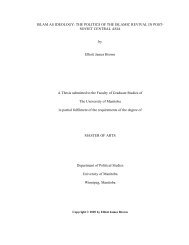
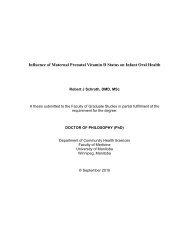
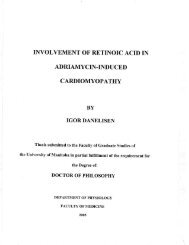
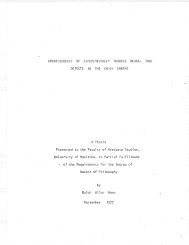
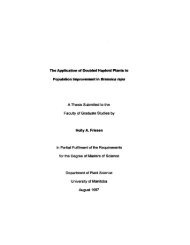
![an unusual bacterial isolate from in partial fulf]lment for the ... - MSpace](https://img.yumpu.com/21942008/1/190x245/an-unusual-bacterial-isolate-from-in-partial-fulflment-for-the-mspace.jpg?quality=85)
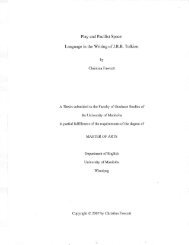
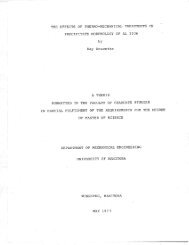
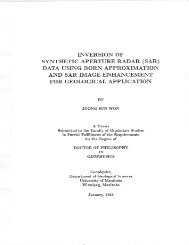
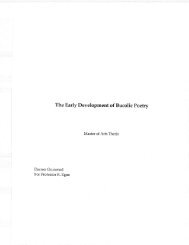
![in partial fulfil]ment of the - MSpace - University of Manitoba](https://img.yumpu.com/21941988/1/190x245/in-partial-fulfilment-of-the-mspace-university-of-manitoba.jpg?quality=85)
